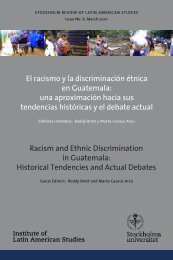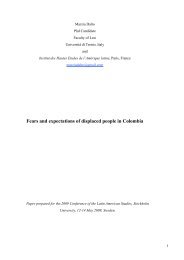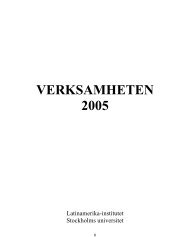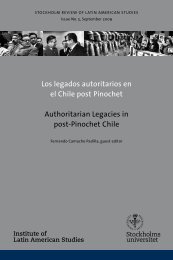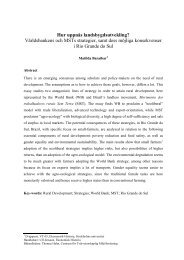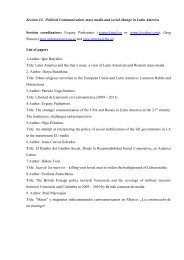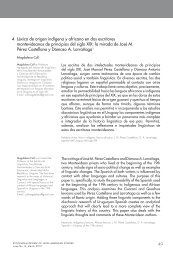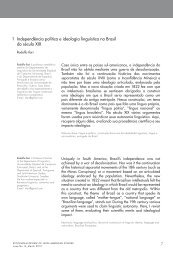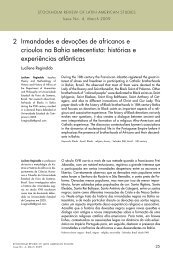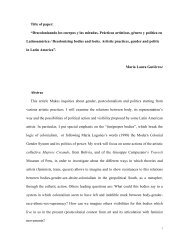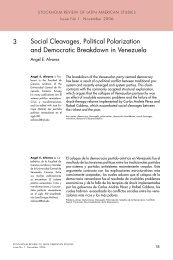Venezuelan Politics and Society in Times of Chavismo PolÃtica y ...
Venezuelan Politics and Society in Times of Chavismo PolÃtica y ...
Venezuelan Politics and Society in Times of Chavismo PolÃtica y ...
Create successful ePaper yourself
Turn your PDF publications into a flip-book with our unique Google optimized e-Paper software.
Social Cleavages, Political Polarization <strong>and</strong> Democratic Breakdown <strong>in</strong> Venezuela<br />
Angel E. Alvarez<br />
forty years AD was the most important labor-based<br />
<strong>and</strong> social reformist organization <strong>in</strong> <strong>Venezuelan</strong><br />
politics, <strong>and</strong> the center-right COPEI was the only<br />
alternative.<br />
Before Chavez’ era, <strong>Venezuelan</strong> politics <strong>and</strong> parties<br />
were so important that, for many years, the<br />
divide between political <strong>and</strong> apolitical was more<br />
relevant than any other cleavage, <strong>and</strong> be<strong>in</strong>g political<br />
meant be<strong>in</strong>g partisan (Martz <strong>and</strong> Baloyra,<br />
1979: 192-193). Consistently, dur<strong>in</strong>g the critical<br />
elections <strong>of</strong> 1993 <strong>and</strong> 1998, the cleavage between<br />
political <strong>and</strong> anti-political was explicitly exploited<br />
by anti-party leaders like Caldera <strong>and</strong> Velazquez<br />
(<strong>in</strong> 1993) <strong>and</strong> Chavez <strong>and</strong> Salas Römer (<strong>in</strong> 1998).<br />
S<strong>in</strong>ce <strong>Venezuelan</strong> democratic <strong>in</strong>stitutions were built<br />
<strong>and</strong> strongly shaped by traditional parties, it is not<br />
surpris<strong>in</strong>g to f<strong>in</strong>d that the cleavage between partisan<br />
<strong>and</strong> anti-partisan turned out to be the conflict<br />
between pro-system <strong>and</strong> anti-system parties.<br />
Electoral support for AD <strong>and</strong> COPEI started to<br />
decl<strong>in</strong>e <strong>in</strong> 1993, <strong>and</strong> s<strong>in</strong>ce 1998 these two parties<br />
have experienced an <strong>in</strong>escapable political decay. In<br />
1998, for the first time <strong>in</strong> the history <strong>of</strong> AD <strong>and</strong><br />
COPEI, these parties ended up support<strong>in</strong>g the Presidential<br />
c<strong>and</strong>idate <strong>of</strong> another political organization.<br />
In the last moment <strong>of</strong> the presidential campaign,<br />
AD abruptly withdrew its presidential c<strong>and</strong>idate<br />
<strong>and</strong> jo<strong>in</strong>ed the center-rightist, pro-neoliberal anti-<br />
Chávez coalition, led by Henrique Salas (from<br />
Proyecto Venezuela). The same th<strong>in</strong>g was done by<br />
COPEI – which previously had launched the c<strong>and</strong>idacy<br />
<strong>of</strong> the <strong>in</strong>dependent ex-Miss Universe Irene<br />
Sáez. In 2000, AD <strong>and</strong> COPEI neither launched their<br />
own presidential c<strong>and</strong>idates nor explicitly supported<br />
Lieutenant-Colonel Francisco Arias Cárdenas, a<br />
former coup-leader who ran as the ma<strong>in</strong> opposition<br />
c<strong>and</strong>idate. 3 In sum, dur<strong>in</strong>g the crucial elections <strong>of</strong><br />
1998, the map <strong>of</strong> party identification was dramatically<br />
reshaped (Mol<strong>in</strong>a <strong>and</strong> Perez 2004). AD <strong>and</strong><br />
COPEI were displaced by newer personalistic parties.<br />
The MVR was the most important <strong>of</strong> these new<br />
parties.<br />
The collapse <strong>of</strong> AD <strong>and</strong> COPEI may be seen more as<br />
an <strong>in</strong>ternal implosion due to lack <strong>of</strong> adaptation to<br />
external changes (Coppedge 2001; Lal<strong>and</strong>er 2004)<br />
than an unavoidable consequence <strong>of</strong> external shocks.<br />
In 1993, the last survivor <strong>of</strong> the partyarchy found<strong>in</strong>g<br />
generation, the aged ex-president Rafael Caldera, won<br />
the elections after divid<strong>in</strong>g COPEI <strong>and</strong> mak<strong>in</strong>g an<br />
acrimonious anti-party campaign. 4 In the same election,<br />
Andrés Velazquez, another anti-party c<strong>and</strong>idate<br />
supported by a th<strong>in</strong>, regional party, abruptly became<br />
a national political leader. Like Caldera, Velázquez<br />
made used <strong>of</strong> extremely radical anti-party rhetoric.<br />
Caldera won the presidential election, <strong>and</strong> LCR took a<br />
significant share <strong>of</strong> votes <strong>in</strong> the congressional election<br />
(see Table ). 5<br />
Later, dur<strong>in</strong>g the 1997 pre-campaign <strong>and</strong> at the<br />
beg<strong>in</strong>n<strong>in</strong>g <strong>of</strong> 1998 campaign, the most traditionalist<br />
<strong>and</strong> oldest members <strong>of</strong> AD led by Luis Alfaro Ucero,<br />
the overly powerful caudillo <strong>and</strong> General Secretary,<br />
blocked any attempt at party renovation. However,<br />
the decay <strong>of</strong> traditional parties <strong>and</strong> the emergence<br />
<strong>of</strong> new leadership were more than evident. In that<br />
election, the front-runners (Hugo Chávez <strong>and</strong> Henrique<br />
Salas) were outsiders, personalistic, anti-party<br />
<strong>and</strong> anti-system c<strong>and</strong>idates. Chavez ran as radical<br />
populist c<strong>and</strong>idate, proud <strong>of</strong> his failed military rebellions,<br />
<strong>and</strong> his co-partisans tended to be much less<br />
3 Francisco Arias Cárdenas, who was second <strong>in</strong> comm<strong>and</strong><br />
dur<strong>in</strong>g the leftist military rebellion <strong>of</strong> February 4, 1992, ran<br />
aga<strong>in</strong>st leftist President Chávez, but he was also a left-w<strong>in</strong>g<br />
c<strong>and</strong>idate. He was explicitly supported by two leftist parties,<br />
La Causa Radical (LCR, the Radical Cause) <strong>and</strong> Izquierda<br />
Democrática (Democratic Left, a faction <strong>of</strong> the Movimiento<br />
al Socialismo (MAS, Movement Toward Socialism); <strong>and</strong> a<br />
small center–right group, (Movimiento de Integridad Nacional,<br />
National Integrity Movement).<br />
4 Caldera was supported by a heterogeneous coalition <strong>of</strong> small<br />
antipartyarchy organizations. He named his amorphous<br />
coalitions chiripero, which <strong>in</strong> colloquial <strong>Venezuelan</strong> Spanish<br />
means a heavy <strong>and</strong> annoy<strong>in</strong>g collection <strong>of</strong> co<strong>in</strong>s <strong>of</strong> small<br />
denom<strong>in</strong>ation <strong>and</strong> a large group <strong>of</strong> small cockroaches. The<br />
w<strong>in</strong><strong>in</strong>g coalition <strong>in</strong>cluded the new Caldera’s party (Convergencia)<br />
<strong>and</strong> a collection <strong>of</strong> small left-w<strong>in</strong>g <strong>and</strong> personalistic<br />
parties: the MAS, the MEP, the PCV, URD <strong>and</strong> many other<br />
even smaller groups.<br />
5 In 1998, LCR split <strong>in</strong>to two groups. The most radical w<strong>in</strong>g<br />
(led by Pablo Med<strong>in</strong>a <strong>and</strong> Aristóbulo Isturiz) created the<br />
PPT. This other party has supported Hugo Chávez as c<strong>and</strong>idate<br />
<strong>and</strong> president. The moderate faction (led by Andrés<br />
Velazquez <strong>and</strong> Alfredo Ramos) has taken part <strong>in</strong> today’s<br />
heterogeneous opposition. LCR’s electoral share shrank<br />
dramatically after the split.<br />
Stockholm REVIEW OF Lat<strong>in</strong> American Studies<br />
Issue No 1. November 2006<br />
20



